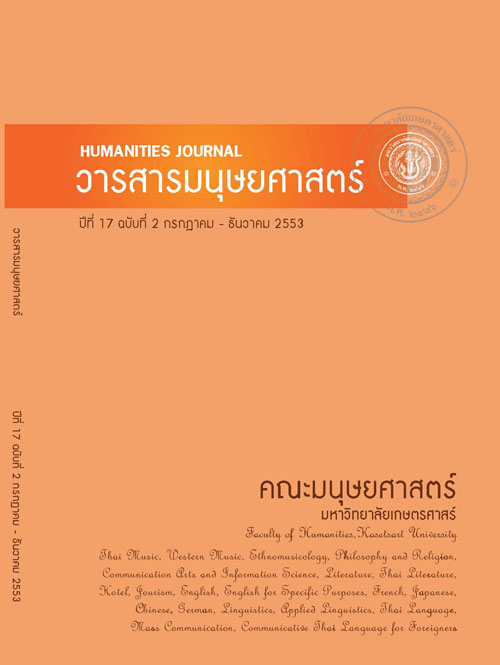บทบาทของมิชชันนารี: กรณีศึกษาคริสจักรอีแวนเจลิค สาธารณรัฐอินโดนีเซีย
Main Article Content
Abstract
งานวิจัยชิ้นนี้มีวัตถุประสงค์เพื่อหาปัจจัยอันเป็นเหตุให้ผู้ที่ไม่ได้นับถือศาสนาคริสต์แต่หันมาเข้าพิธีบัพติสมาเพื่อเป็นคริสตศาสนิกชน ณ คริสตจักรอีแวนเจลิค สาธารณรัฐอินโดนีเซีย กลุ่มประชากรคือ ผู้ที่เข้าพิธีบัพติสมาจำนวน 440 คน เครื่องมือที่ใช้คือแบบสอบถามและการสัมภาษณ์
ผลการวิจัยพบว่าปัจจัยที่มีอิทธิพลต่อการเปลี่ยนศาสนาเรียงตามลำดับนี้คือผู้เปลี่ยนพบวิกฤติหรือปัญหาชีวิต พวกเขามองว่าศาสนาใหม่ที่ตนนับถือสามารถแก้ปัญหาชีวิตได้ รองลงมาคือ การมีประสบการณ์ส่วนตัวและรู้สึกว่าพระเจ้าตอบคำอธิษฐาน และการเปลี่ยนศาสนาสามารถทำให้ชีวิตของพวกเขาดีขึ้น ศาสนาที่เปลี่ยนใหม่เพิ่มความเป็นตัวตนของพวกเขาได้ ตามมาด้วยความรู้สึกทางด้านจิตใจและจิตวิญญาณ รองลงมาคือปัจจัยทางเศรษฐกิจ ตามมาด้วยปัจจัยทางการเมืองและปัจจัยทางด้านสังคมอันเป็นเหตุให้ตัดสินใจเปลี่ยนศาสนา นอกจากนี้ ยังมีปัจจัยอื่นๆ ที่พบรองลงมาคือมีพระเยซูเป็นแบบอย่างในการดำเนินชีวิต การแสวงหาข้อมูลข่าวสารเกี่ยวกับคริสตศาสนาอันนำไปสู่การตัดสินใจเปลี่ยนศาสนา การได้รับแรงบันดาลใจ จากพระคัมภีร์ การเจ็บป่วยไม่สบายและการมีประสบการณ์ใกล้ความตาย การมีปฏิสัมพันธ์และความผูกพัน กับคริสตศาสนิกชนและมิชชันนารี และมีความประทับใจในบุคลิกลักษะรวมถึงการดูแลเอาใจใส่ของคริสตชน
ส่วนข้อมูลด้านประชากรพบว่า เป็นชาย 197 คน หญิง 243 คน ส่วนใหญ่มีอายุระหว่าง 16 – 20 (132 ราย) รองลงมาคืออายุ 21 – 25 (109 ราย) อายุ 26 – 30 ปี (98 ราย) อายุ 31 – 40 (44 ราย) อายุ 41 – 45 (52 ราย) และ 51 – 60 (5 ราย) ทั้งนี้ ไม่พบผู้เปลี่ยนศาสนาที่มีอายุเกิน 60 ปีแต่ อย่างใด ผู้เปลี่ยนส่วนใหญ่มีการศึกษาระดับปริญญาตรี 258 ราย รองลงมาคือชั้นมัธยมปลาย 109 ราย และปริญญาโทหรือสูงกว่าทั้งหมด 73 ราย
Roles of Missionaries: A Case Study of Evangelical Church in Indonesia
Anikamarn Chitpakdee, Singkham Nantaphum
The research aims at finding out factors relevant to religious conversion of non-Christians who were baptized at the Evangelical Church in Indonesia. The population was 440 converts. The instruments were questionnaire and interview.
The results show that factors relevant to religious conversion are as follows: having crisis in life, converting as a way to solve life problems, having a religious experience, feeling that God answers prayer, having a better life after religious conversion, increasing a sense of self-identity, having psychological, spiritual, economical and political problems, having Jesus as a role model in live, searching for the information about Christianity, being inspired by the Bible, having a near-death experience, having social interaction with Christians and missionaries, and being impressed by Christian care and characters.
As for the population, the findings show that they are 197 males and 243 females. Most converts are the late teenagers and the early adults. That is, most are 16-20 years old, followed by 21-25 years old, and 26-30 years old. There are only 5 converts who are 51-60 years old, and there is no convert who is over 60 years old. As for levels of education, most converts have Bachelors’ degree, followed by high school, and there are only 73 converts with postgraduate or higher degrees.


